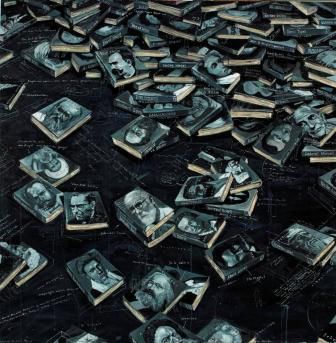Gusmen
The Philosophers, 2014
Acrylic on Canvas, 145 x 145 cm
Chat with us on WhatsApp
About the artwork
Gusmen Heriadi started his career as an illustrator for the alternative newspaper Pualiggoubat Mentawai, during which he encountered a variety of visual material that he experimented with to create a pastiche of symbols and meanings. Books, newspapers, and other textual elements are recurring motifs in his work, which many people assume to have been influenced by his early life. Gusmen uses these motifs to communicate his highly instinctive and personal vision of cultural life in Indonesia. The objects featured in his paintings are often metaphors of his feelings and inner debates about the issues of culture and tradition in a modern society. Most of his works are products of his dreams, his responses to life, and his philosophical views. These philosophical and critical thoughts are the result of cultural forging and family habit, as well as influences from the breadth of his artistic life and pursuit. His paintings frequently depict objects that emblematize the ever-changing perspectives towards the issues of culture and tradition in modern society. Gusmen's heavily semiotic approach also leads one to realize that art is an essential medium through which one may contemplate human existence.
About the artist
Gusmen Heryadi was born in 1974 in Pariaman, West Sumatra, Indonesia. Having graduated from the Indonesian Institute of the Arts (ISI) in 2005, he now works as an illustrator at Tabloid Altternatif Pualiggoubat Mentawai in his hometown. Gusmen has been actively exhibiting his work over the past two decades. He won an award in Indonesia for Space and Image, that is exhibited at Ciputra World Marketing Gallery. He has also been a finalist of both the Philip Morris and Indofood Art Awards (2000 and 2002), and has been honoured with a Special Appreciation w for the Jakarta Art Award in 2006. The objects featured in his paintings are often metaphors of his feelings and inner debates about the issues of culture and tradition in a modern society. Most of his works are products of his dreams, his responses to life, and his philosophical views. These philosophical and critical thoughts are the result of cultural development and family habits, as well as influences from the breadth of his artistic life and pursuits.
Go to Gusmen's profile ›



